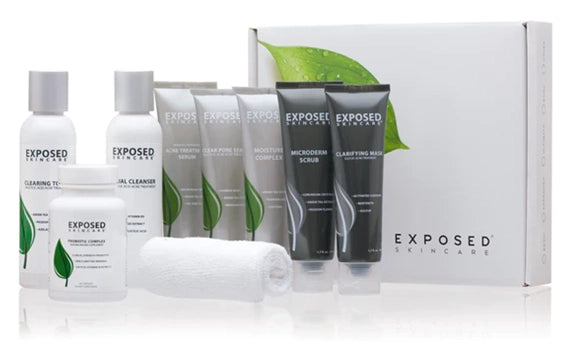Many of us scrutinize our diet with a magnifying glass, questioning the impact of every food item. Among these, oats—a staple in many diets—often come under the spotlight.
The question, "Does oat cause acne?" is not just common but also layered with numerous facets. This comprehensive guide aims to dissect this question, looking at oats in various forms, including oat milk, and their relationship with skin health.
Also read: How to choose the best acne treatment
Biggest Take-Aways:
- Oat milk may contribute to acne due to added sugars and its glycemic index, but it's not a direct cause.
- Diet plays a significant role in skin health, and certain foods can exacerbate acne.
- Personal skin type and sensitivities greatly influence how dietary choices like oat milk affect acne.
- Exposed Skin Care offers a targeted approach to acne management, working well with various skin types and complementing dietary considerations.
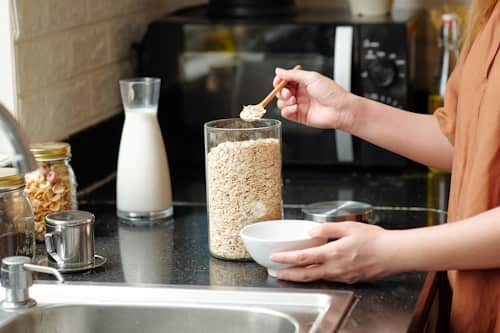
Understanding Acne: A Brief Overview
Before delving into whether oats contribute to acne, it's essential to grasp what acne is and what causes it. Acne is a common skin condition characterized by the appearance of pimples, blackheads, and cysts, primarily due to clogged pores. Factors like oil production, dead skin cells, hormonal fluctuations, and inflammation play pivotal roles in the development of acne.
Hormonal Acne: A Key Factor
- Definition: Hormonal acne is typically linked to hormone fluctuations, which can affect oil production in the skin.
- Impact on Skin: These hormonal changes can increase sebum production, clogging pores and causing breakouts.
The Role of Diet in Acne
- Influence: Diet can affect acne development, especially foods that cause hormonal imbalances or inflammation.
- Common Culprits: Foods high in sugars, dairy products, and certain fats are often associated with acne.
Does Oat Cause Acne?
In their natural form, oats are a healthy, fibrous grain that is generally beneficial for the skin. However, how oats are consumed and processed can impact acne.
Oatmeal and Acne
- Natural Oats: Pure oatmeal, without added sugar or dairy, is less likely to contribute to acne.
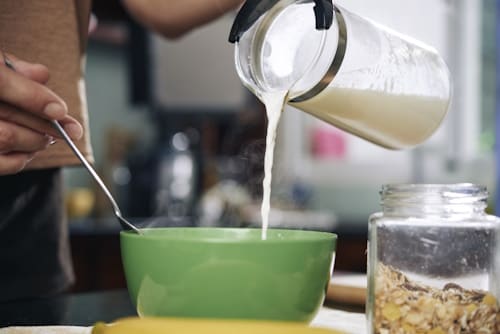
- Added Ingredients: Oatmeal with added sugars or dairy can increase the risk of breakouts.
Oat Milk and Acne
- Popularity: Oat milk has gained popularity as a milk alternative, but its effects on acne are subject to debate.
- Considerations: Oat milk that contains added sugars or oils may contribute to acne in some individuals.
Does Oat Milk Cause Acne?
- Processing Matters: Commercial oat milk often contains additives like sugars, which can spike insulin levels and potentially lead to increased sebum production.
- Comparison with Dairy: While cow's milk is often linked to acne, oat milk's relationship with acne is less clear-cut.
Oat Milk vs. Other Milk Alternatives
- Almond Milk: Often considered a safer choice for acne-prone skin due to its lower sugar content.
- Soy Milk: Contains phytoestrogens, which might affect hormonal balance, potentially triggering acne in some.
- Coconut, Hemp, Macadamia, and Cashew Milk: These alternatives vary in their impact on acne, with sugar content and individual sensitivities playing a role.
The Complexities of Diet and Skin Health
How Foods Can Cause Acne
- Insulin Spikes: Foods that cause a rapid increase in insulin can increase sebum production, clogging pores.
- Inflammatory Foods: Diets high in inflammatory foods can exacerbate skin conditions like acne.
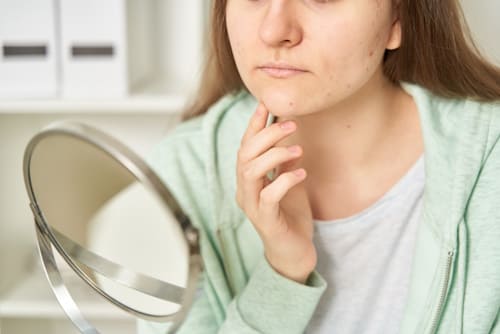
Foods to Avoid for Acne-Prone Skin
- High Glycemic Index Foods: These can trigger hormonal fluctuations and inflammation.
- Dairy Products: Skim milk, especially, is often associated with acne due to hormones and growth factors.
Incorporating Oats into a Skincare Routine
- Topical Benefits: Oats have anti-inflammatory properties and can be soothing when applied topically.
- DIY Treatments: Oat-based masks and cleansers can help treat acne and improve skin health.
Oat Milk and Hormonal Factors
Does Oat Milk Really Affect Hormonal Acne?
- Indirect Effects: While oat milk doesn't contain hormones, its impact on insulin can indirectly affect hormonal balance.
- Comparative Analysis: Unlike cow's milk, oat milk is less likely to influence hormonal acne directly.
Managing Acne: Beyond Diet
Skincare Routine for Acne-Prone Skin
- Gentle Cleansing: A mild cleanser removes excess oil and dead skin cells.
- Non-Comedogenic Products: Choosing skincare products that do not clog pores.
- Regular Exfoliation: To remove dead skin cells and prevent clogged pores.
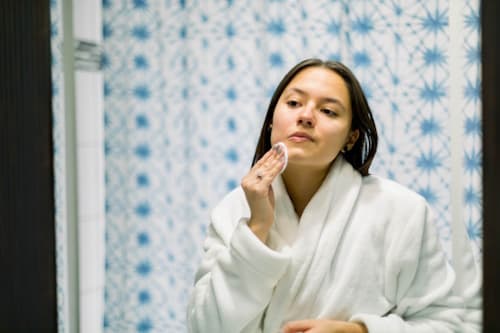
Lifestyle and Acne
- Stress Management: High stress can worsen acne by affecting hormonal balance.
- Adequate Hydration: Essential for maintaining healthy skin cells and reducing oil production.
Treating Different Types of Acne
- Topical Treatments: For mild to moderate acne, use salicylic acid or benzoyl peroxide products.
- Severe Acne Management: May require more intensive treatments like retinoids or antibiotics.
The Verdict on Oats and Acne
Understanding the Individual Response
- Personal Sensitivities: Each person's skin reacts differently to foods, including oats.
- Trial and Error: Eliminating and reintroducing oats can help determine their impact on one's skin.
Potential Benefits of Oats for Skin Health
- Nutritional Value: Oats are a good source of nutrients and have anti-inflammatory properties.
- Healthy Skin Maintenance: They can help to protect the skin and may improve acne-prone skin when consumed in a balanced diet.
The Advantages of Exposed Skin Care in Managing Acne
In the realm of skincare, particularly for those combatting acne, Exposed Skin Care emerges as a commendable option. This line of products is tailored to tackle various factors that lead to acne, ensuring a comprehensive approach to skin health.
Here are the benefits of Exposed Skin Care:
- Targeted Treatment: Exposed Skin Care is formulated to specifically address the root cause of acne breakouts, offering a targeted solution.
- Compatibility with Different Skin Types: Whether you have oily, dry, or combination skin, Exposed Skin Care products are designed to be effective across various skin types.
- Prevents Worsening of Acne: Regular use can help prevent factors that make acne worse, ensuring clearer skin over time.
- Safe with Dietary Choices: For those pondering over whether oat milk or coconut milk may impact their skin, Exposed Skin Care offers a reassuring consistency in results, irrespective of such dietary choices.
- Complementary to Diet-Related Skin Care: While diet plays a crucial role in skin health, and certain foods like milk may contribute to acne, using Exposed Skin Care can provide an extra layer of defense against diet-induced acne issues.
Incorporating Exposed Skin Care into your skincare routine can offer a multi-faceted approach to treating and preventing acne, working alongside dietary adjustments to promote overall skin health and clarity.
Conclusion
While consuming oat milk may not directly cause acne breakouts, it's crucial to understand that it can contribute to them, especially if you're prone to acne flare-ups. The added sugars in some oat milk variants can lead to acne breakouts.
Even alternatives like oat milk can trigger skin issues for those with sensitive skin. The role of oat milk in skincare is equally nuanced. While using oat milk in your skincare routine can be soothing, monitoring its effects on your skin is essential.
Products like oat milk might not be the sole cause of acne, but they can contribute to its development, especially if your skin is susceptible to dietary triggers. In the context of acne treatments, the role of diet cannot be overlooked.
Foods that are typically considered healthy, like oat milk, might still pose potential acne risks for some. It's vital to assess whether oat milk is right for your skin type and to observe any changes in your skin health when consuming oat milk or using it in your skincare.
Integrating products like Exposed Skin Care can be beneficial. They can work alongside dietary choices to manage and improve acne, offering a comprehensive approach to skincare. Balancing diet, skincare routines, and effective acne treatments makes achieving clearer, healthier skin more attainable.
FAQs
Does Consuming Oat Milk Cause Acne?
While oat milk itself is not a direct cause of acne, its added sugar and high glycemic index can contribute to acne in individuals with sensitivities.
Can Oat Milk Be Part of a Skincare Routine for Acne-Prone Skin?
Oat milk can be soothing and beneficial when used topically, but observing how your skin reacts is essential, as it may vary from person to person.
Is Oatmeal Likely to Cause Acne?
Oatmeal, in its natural form, is less likely to cause acne. However, added sugars or dairy in oatmeal can increase the risk of breakouts.
What are the Effects of Other Milk Alternatives like Hemp and Macadamia Milk on Acne?
Hemp and macadamia milk have different compositions and may have less impact on acne than oat milk, especially if they are low in added sugars.
How Does Exposed Skin Care Help Manage Acne?
Exposed Skin Care targets the root causes of acne, is suitable for various skin types, and helps prevent factors that lead to acne breakouts, complementing dietary and skincare routines.










